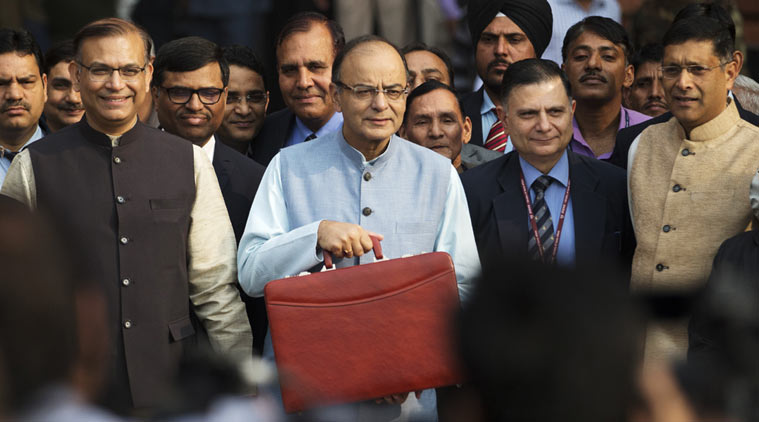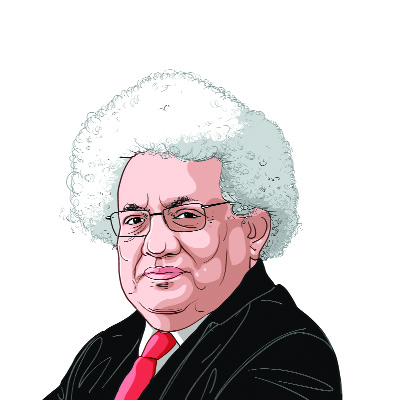Opinion Out of my mind: The gamechanger Budget
The tricky task for the Finance Minister was to gauge where the economy was heading.
 Indian Finance Minister Arun Jaitley, center, leaves for annual budget presentation at parliament in New Delhi, India, Monday, Feb. 29, 2016. It was Jaitleys second full budget since Prime Minister Narendra Modi won a huge majority in national election in 2014, on the back of promises to turn around the economy and boost job creation. There have been few sweeping reforms in the past two years that the government has been promising. (AP Photo /Tsering Topgyal)
Indian Finance Minister Arun Jaitley, center, leaves for annual budget presentation at parliament in New Delhi, India, Monday, Feb. 29, 2016. It was Jaitleys second full budget since Prime Minister Narendra Modi won a huge majority in national election in 2014, on the back of promises to turn around the economy and boost job creation. There have been few sweeping reforms in the past two years that the government has been promising. (AP Photo /Tsering Topgyal)  Union Budget 2016: Arun Jaitley announced a slew of measures for the the farm sector.
Union Budget 2016: Arun Jaitley announced a slew of measures for the the farm sector.
The most difficult moment for a Leader of the Opposition in the House of Commons comes when he has to respond to the Budget speech just made by the Chancellor. He has to be quick, economically savvy and politically sharp.
It would have been difficult for any opposition leader to make an articulate intervention to Arun Jaitley’s Budget. Most reactions were political hot air. All the discussions beforehand were about the urban demands, about industrial needs and bad debts of banks. The government had been facing a firestorm on the JNU issue. This Budget had to get the economic answer right.
In the event, the Budget was as much astute politics as sound economics. When the noise was about slogans of Kashmir ki azaadi and Afzal Guru, the narrative was turned towards the distress in rural India after two years of drought. Rarely has a Budget speech begun and stayed on rural India as the principal theme. The BJP used to be known as the party of urban traders. This was a move which changed that perception.
The tricky task for the Finance Minister was to gauge where the economy was heading. The recent revision of economic statistics by the CSO has caused confusion. The signals are conflicting. Is India the fastest growing economy in the G20? If so, why are many data — on exports, on industrial production — pointing downwards? Does the economy need a kick-start or was it doing alright? These judgments were as political as economic.
In the event, the answer was yes and no. The overall numbers were sound but there was rural distress rather than urban/ industrial slowdown. The emphasis had to be on rural demand, rural output and rural welfare. There was need for long-term structural reform. The long-standing problem of depletion of water sources had to be urgently addressed after years of neglect. Rural roads had to be built and demand stimulated by passing money to panchayats. Crop insurance had to be introduced after years of discussion.
The ranking of priorities in the nine pillars of the Budget also gave a higher status to women’s health and the replacement of old smoky chullah with LPG connections. Budgets do not often worry about women’s issues. India’s record has been abysmal in the Human Development Index because, even after 1991, the issues of women’s welfare were seldom frontline.
The crucial choice was whether the deficit target should be breached to boost the urban industrial economy. The answer was that if the economy was growing at the highest rate in G20, then there was no need for a kick-start. The issue of banks’ bad debts can be tackled to reignite infrastructure investment but that did not require fiscal misbehaviour. The so-called Neo Middle class was reminded that there were people worse off elsewhere in the economy.
The promise to double farmers’ incomes by 2022 is a risky one. FDI in food processing will cut down on food spoilage which runs at 20 per cent now. The irrigation will raise productivity on small as well as large farms. The wide gap between what the consumer pays and what the farmer gets will be narrowed. All this may help but it is still a gamble on good monsoons and no drought. Re-election depends on this.





